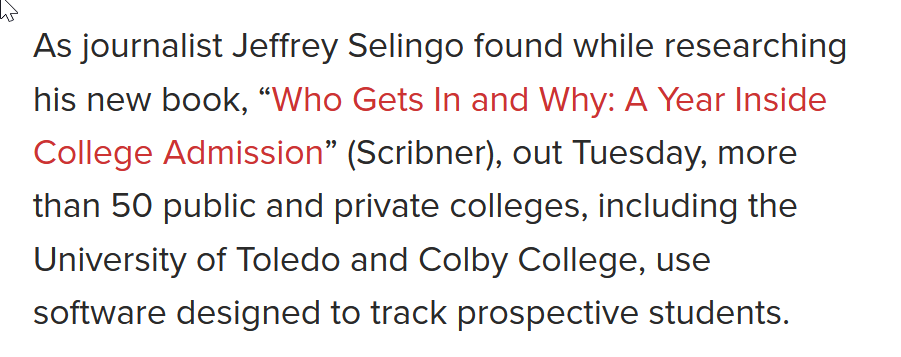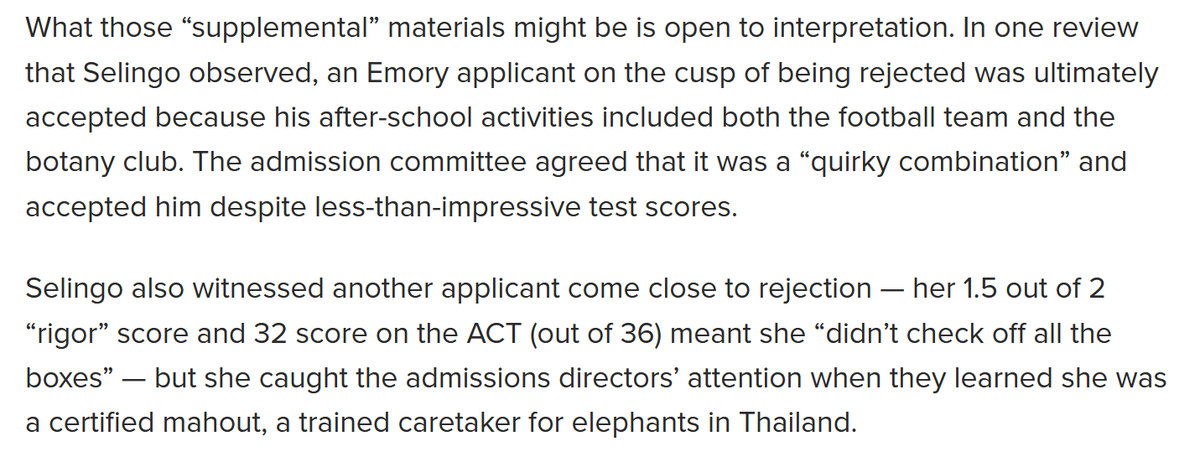Thread: The NY Post decided to write an article about the new book by @jselingo
I am no New York expert but I don't get a good impression from the Post most times I read an article there.
But I thought this might be an exception. It's not.
I am no New York expert but I don't get a good impression from the Post most times I read an article there.
But I thought this might be an exception. It's not.
More than 50 is technically accurate. But it's probably actually more like 1500. Still, of course, the reality is that it only matters at 50 at most, and--no offense intended--University of Toledo is probably not one of them. 

I've worked at six colleges, and while this technology wasn't around until recently, even if it had been, it would have maybe been used at one of them.
That's because there are only two types of colleges in the US: Those that deny students they would like to admit (maybe 40) and those that admit students they'd probably like to deny (everyone else.)
Admissions is not usually a process of turning down well qualified students.
Admissions is not usually a process of turning down well qualified students.
I always get a chuckle out of the unnecessary use of quotation marks. It makes me fill like I'm being lectured.
I went to Catholic school with nuns, NY Post. You don't scare me.
I went to Catholic school with nuns, NY Post. You don't scare me.

Yes, college enrollment boomed in the 60s. But it's not just the baby boom. It was two offshoots of the military industrial complex: The GI Bill and the Vietnam War. College-educated parents wanted their kids to go to college, and to avoid the draft. 

Here's the data on that nces.ed.gov/programs/diges…
I believe College Board Student Search Service started in the mid 1970s but am too lazy to look right now. Anyway, it wasn't just selectivity; it was survival. Peak live births in the US happened in 1957. Colleges could see the drop coming. 

In order: False, false, probably true probably true, probably true, and probably true. But the rejoinders are based on fault premises. 

I suspect--but might be wrong--that the "Latting Index" is used at Emory, given that the Chief Enrollment Officer there is John Latting. While it's true many colleges use an index, I don't know that they all use his. 

The two paragraphs make me hate my profession. Botany and football are "quirky?" Only if the kid is trying to grow non-GMO modified vegan footballs. It's more likely he's an athlete, which is another story all together. 

And low-income kids reading that second paragraph
And I believe my good looks are why I have over 5,000 followers on the Twitters, mother who is way too involved in her kid's college search (I bet he applied early and checked "no" on the financial aid question. 

Which sentence is more wrong: Charles Manson was misunderstood; Barney Rubble was the greatest actor of the 60's, or the first sentence in this paragraph? 

I want to be clear: I've not yet read Jeff's book, and my criticism is of this piece of sloppy journalism, not the book it's reviewing. It's laden with the same misconceptions many in the media have of how we do our work, and it lumps college admissions into one big thing.
Several years ago, I wrote a chapter in this book, which was intended to be the text for the first class in a master's program in Higher Ed. You can read most of that chapter here. amazon.com/Contemporary-C…
We are not monolithic. Talking about "College Admissions" is not about college admissions. It's about that office, at that one college, based on that university's mission and goals.
That's it.
That's it.
So, it's up to us to keep explaining this. We owe it to ourselves and to the kids who want and deserve a chance at college.
It should be the thing that makes us all blue.
I can't add another tweet here, so
Oh, and #EMTalk
It should be the thing that makes us all blue.
I can't add another tweet here, so
Oh, and #EMTalk
• • •
Missing some Tweet in this thread? You can try to
force a refresh





















